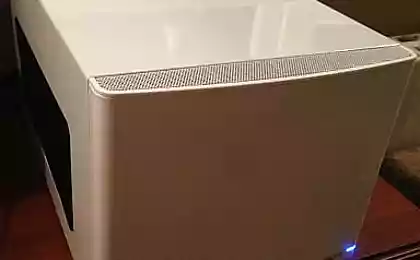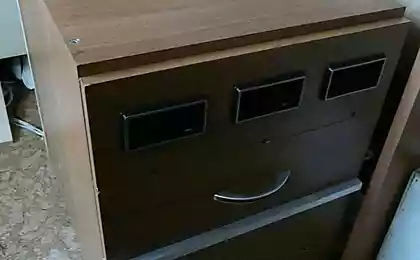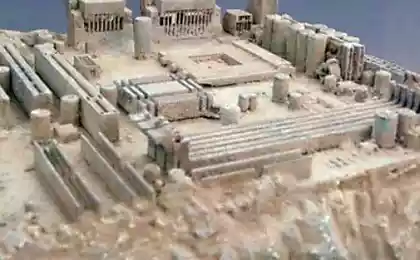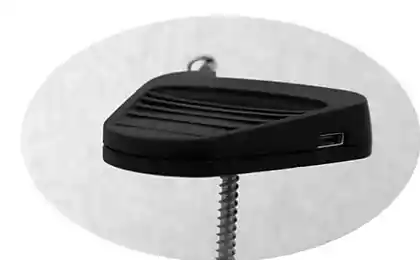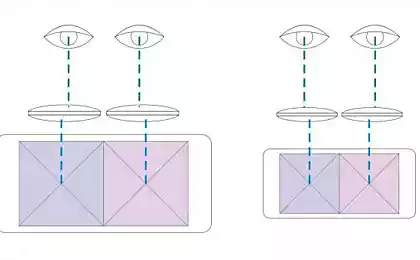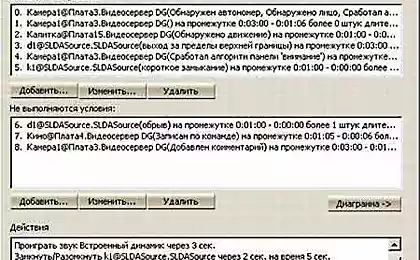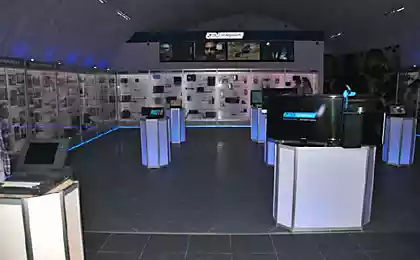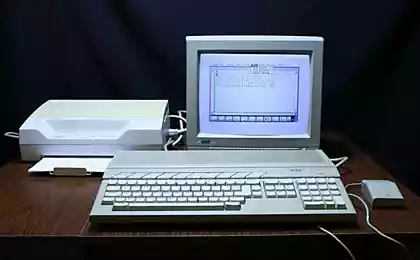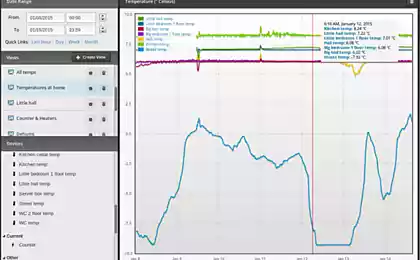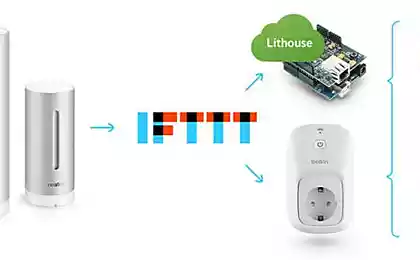800
Do I need a computer motherboard?
Something went recently posts about the production of domestic processors. And many are asking, and who will do them motherboards. Let me make a small post in which I will explain that familiar to us the motherboard is not an inherent part of the computer.
The text will be simplified as much as possible, so that the experts - do not swear much.
In addition, I write it on the train, so the possibility to check the historical facts I have not. I will write from memory, if mistaken - correct, but do not swear much, and write a better . It will be 12 pictures, please do not break, the end will outline separately. So. Talk about computers and their destiny.
In the photo - the unnecessary parts of the computer are thrown to the dustbin of history ...
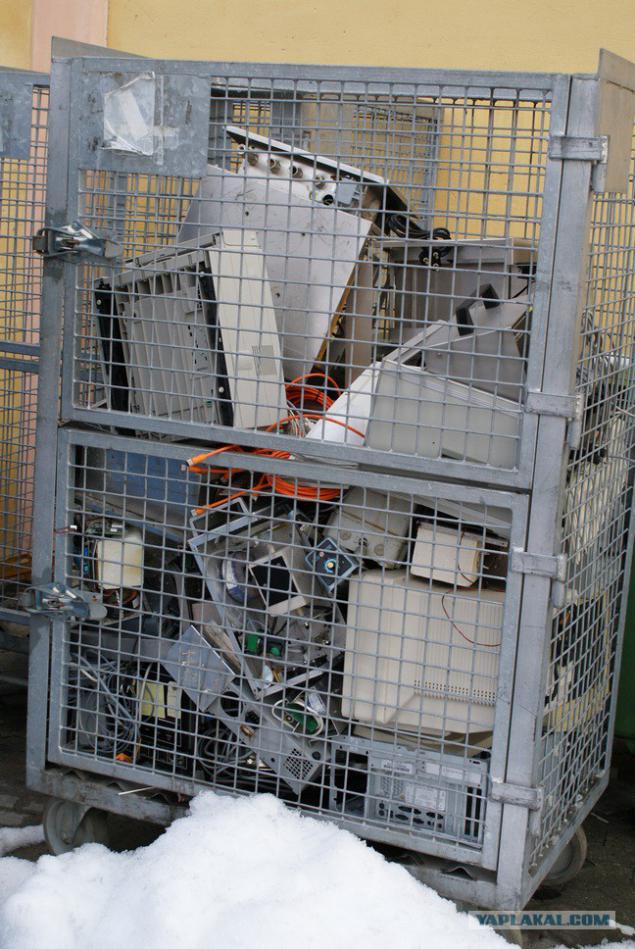
First there was ... No, about computer dinosaurs, we will not talk. Let's just talk about the computers that belong to a microcomputer. What they had (and have) the structure?
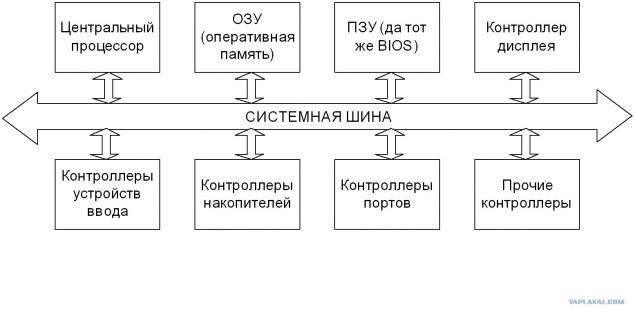
And indigenous producers tried to sculpt everything on one card. Is that for the concept of "other controller" made expansion slots. But if you bought a computer in such a configuration, hello, enjoy them. Overall, it gave benefits from the taiga to the British seas configuration was united, there was no compatibility issues. But on the other - for Awareness, we had to buy everything new. And it is here that some genius, probably in the company IBM (may not be there - in the DVK was also something like that, but someone who stole - I do not know) has decided that a good idea would be to make an open architecture. The vast majority of devices, it was decided not soldered to the board. Instead, they are produced in small shawls (subsidiaries), and inserted into the motherboard, which is performed for the most part, unifying function. Houses pick wallpaper Google that explains it.
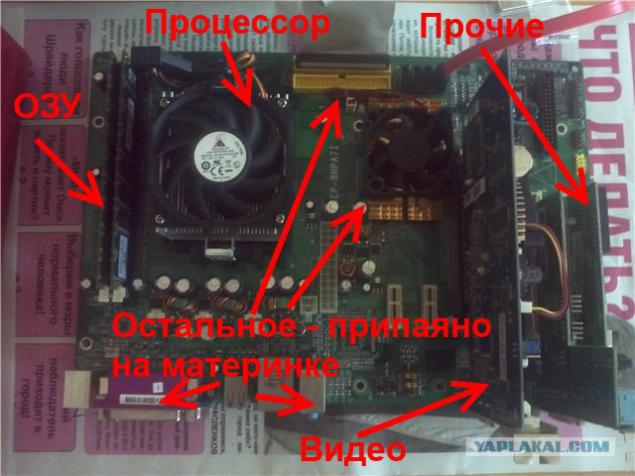
This ideology, applied to the IBM PC, broke the existing world order. First, of course, it was a complete mess, and incompatibility. But then came the specification PnP, there are good bus and everything was just wonderful. If we need something to replace - we simply confiscate cheap relevant fee (although a processor, memory even though the controller) from the motherboard and change it to another, leaving the system in a safe and sound, so we can gradually expand the computer (especially - in those a time when there was a race of new sockets and tires).
Computers made on this architecture, entered our life and in the office. Accordingly, we see them more often, and there is a feeling that's different and can not be. However, and who said that he could not? In the late 70s, for spacecraft, the firm has created an amazing Intel chip. By that time the domestic terminology it was called, no less, a single crystal micro-computer. The fact that Intel engineers have all the parts of the computer, that I mentioned above, but a little bit. RAM they have taken a few hundred bytes of ROM - a few kilobytes, the processor - a simple, chetyrёhbitny, the display was not, but there were serial and parallel ports. Since it was plain - it is perfectly fit on a single chip. That is, put on a single chip. Now I'll put a picture on the wrong chip, but with a similar size to the one (40 foot). The photo controller newer, but the essence is not in letters and in size.
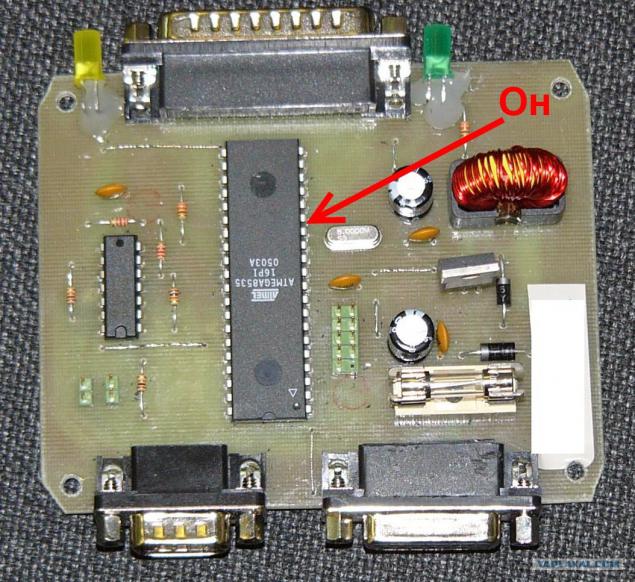
4 bit controller did not catch on. But it has come to replace the 8-bit MCS-51 caught on how! No, he had not an exact copy of release, but the software is fully compatible improved version (for example, 4 cycles per team instead of the 16 in the original) still do many of the firm (let alone more than thirty years have passed). Let's look at a block diagram of the controller in the implementation by Atmel. The truth seems to be that I showed you in the beginning? Once all of these elements are not placed on the board and on the chip, which lives inside the chip!
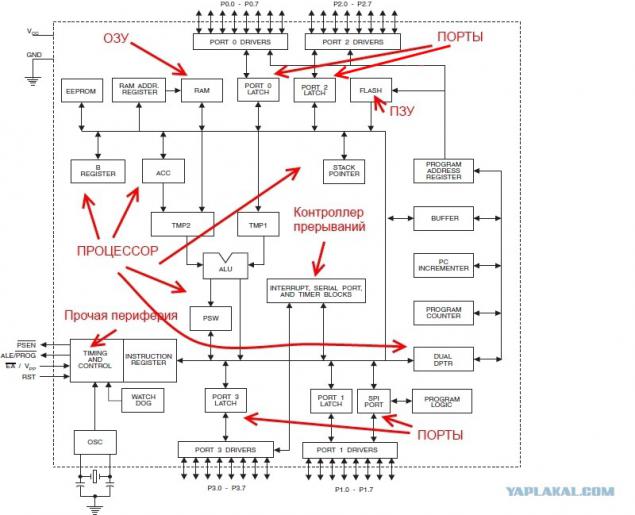
You say, "Why do I have on the table is the PC, and not the little one?". My answer is - they do not for that matter. Let's look around. Here is a traffic light. They can be controlled by a simple machine, but let's say, if we want to change the mode depending on the time of day (or better - from road conditions), is not easy to do it with a computer? But do not drag the sake of the PC! The program is simple, the output port must be in the number of light bulbs in all traffic lights, plus input from the sensors of the situation. It turns out that the device will come in handy here. Have you been on the old elevators? At that it was necessary to keep the finger until you're blue call button to be the first to grab it as soon as it becomes available. This is because they simply ran the logic. Modern computer controls. Again, why there is power PC? It's simple, suitable and microcontroller. In the car right now any of these controllers - like seeds in a sunflower. In general, there are many applications where you can put this little friend, instead of a huge fools, which is sensitive to climate (aka Pin oxides), gluttonous, huge, not like vibrations (hard drive osypletsya) and so on. Inserting photos of modern fine controller standing on our board. Scale determine the 10 pin connector. Or, say, between the cogs on the terminal board 5 millimeters. The board receives data from the bus digital scales (which are not intended for this purpose) and transmits them to the digital radio broadcasting.
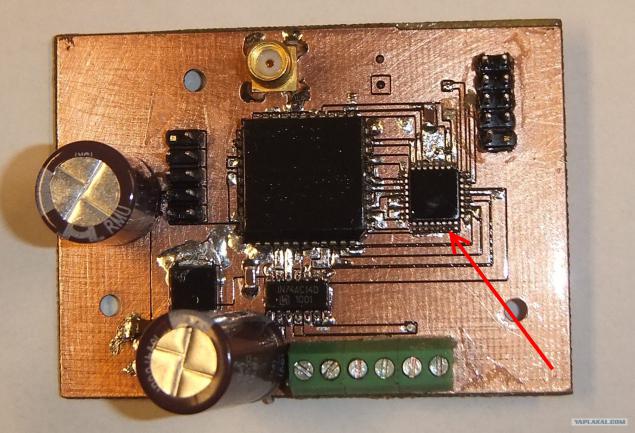
Or here's another case. Automatic opening-closing lid tank helicopter (I had such a position, who wants to - find). Initially, there was not such a fool's and horse dorozhennymi relyushkami a child's fist size that periodically oxidized and change - terrible costs money. The logic has been implemented in the same relay. Currents there, of course - in the cast of 25 amperes. But still ...
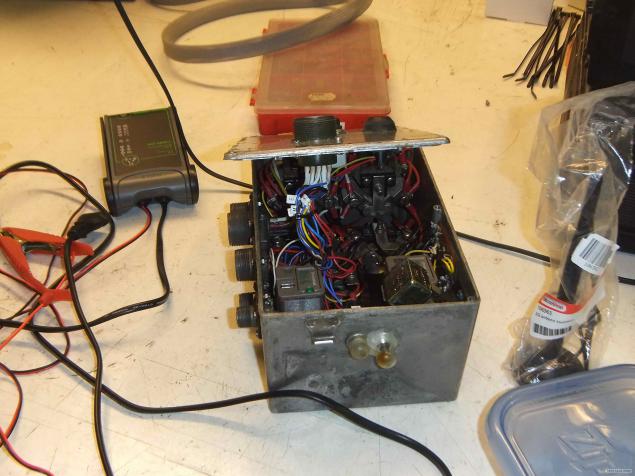
We have proposed to replace the transistors. The customer agreed. We quickly made the charge, which implemented the logic in the relay. Tested - it works. We put on a week-long test - worked. Hooking up to the helicopter - burns within 3 seconds. What? A long cable rattles, and even source - the relay, it also gives bounce. And during the bounce triggered the shoulder "Open", then "Close". Relays - the brakes, they do not care, transistors - more bright, that a short circuit arises. Tried to add filters, tried - the delay line on the capacitors - were something horrible: buggy and complicated in its structure goes. Then we take and replace the controller logic block. Along the way, add logic to soft start the motor by reducing the starting current roll, so - reducing the interference bortseti. And yet it turned out, the relay will start the engine, standing on the brake, because they often burn? We did delay from brake release before starting. In many utilities controller gave. And, as we see, motherboard here nafig not surrendered. Controller - in the thick of things, between inputs and outputs. And he sets the logic.
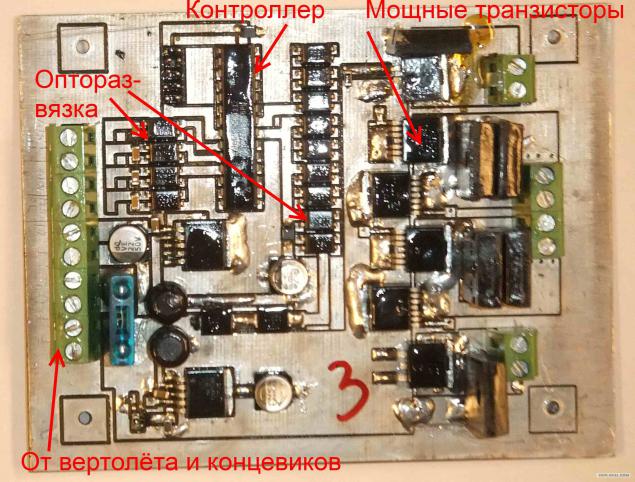
So, we found out that there are such beasts as microcontrollers, that they - themselves motherboard, because they contain a little of everything, so they were called in the USSR a single crystal microcomputer. We found out that they are designed for the needs of management of any equipment from the spacecraft to the intercoms (including recognition of "tablets"), so they were called overseas microcontrollers. And we have already seen the first generation - 8 bit MCS-51, which does not need a motherboard, as all units he etched on the main chip (about the possible external RAM and ROM I keep silence, to no one confuse). Almost immediately after that, Intel has released a 16-bit controllers tents MCS-96 (development - MCS-196). They had a much more successful architecture, do not speak out of nowhere, I was fortunate to work with them, but to the masses, they somehow did not.
Oh, and then began a controller boom. All companies considered it their duty to release any of the controllers with its unique architecture. Every company these architectures were several pieces. There were experiments with the bit processor core, because technology does not stand still, and in a crystal could put the core of powerful. There were 8, 16, 32 bit kernel. Oh, if I had poizuchat different assemblers! In different controllers shoved different peripherals someone in that much.
Needless to say, come and exclusion ideology. 32 bit kernel - this is clearly a great memory, so controllers steel output line for connection of RAM, which again began to solder the outside. Also steel output system bus as expansion slot. So basically, the motherboard has already become possible to connect, if not for one thing. Still, they are designed for the needs of management. Let me diluted Image text where our board controller is connected via a bus to the FPGA, in which we bundled software blocks that is not in the controller.
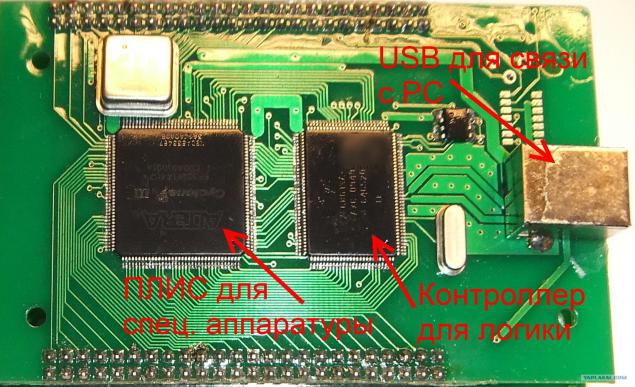
And suddenly the whole orgy of architecture has gone on there. And to blame the firm ARM, who came up tents RISC architecture (added - they do not come up very RISC, they came up with their architecture-based RISC) and now it is gradually developing. Architecture - floating. You can turn on the weaker, but poekonomichnee (coded command 16 bit words), but you can - porastochitelnee but poproizvoditelnee (encoded 32 bit words). Obrayuatyvaemye data - 32 bit (and new versions are already 64 bit rudiments appeared).
His processors they do not produce, they only make architecture and sell them. Already manufacturers - buy and sell ideas in crystals. Anyone who previously rivet their decisions, or fold them away from sin and switching to ARM, or continue to make their own, and ARM - also released. Let's open up my home computer and see it (the house open and sfotkayu). That's hard drive. In it manages all the affairs of ARM. ARM is engaged in translation logic in physics, the speed of rotation of the support, holds the head on the track ... No, I do do special terminal chips, but if you look at the "firmware", you will see that all the logic is still on the controller.
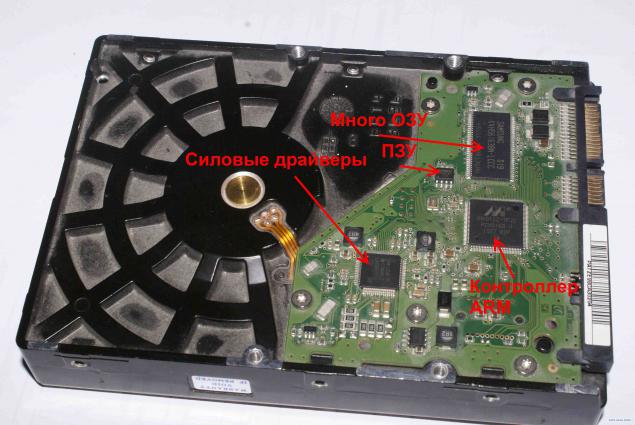
Here the optical drive. They ARM is not domination, but still gradually displaces all other architectures. In my it's worth. Of course, the manufacturer has placed on the periphery of the bunch this crystal-specific optical drives. It - special version of the controller, for other tasks, it is not suitable. And that's the beauty of their production - you can order something special, and we will not give up. But in simple shops selling peripheral controllers with the average on board. Che's something I'm too lazy to open again, and the old photo is not very photogenic. Naidu-ka I charge the same for Google.
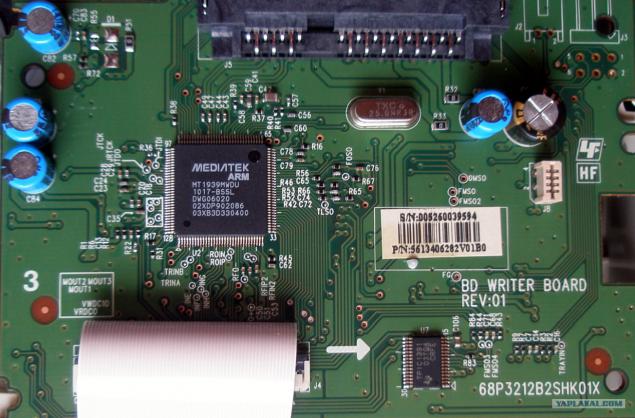
In short, we found that the microcontroller - is a computer that has the vast majority of devices are etched on the main chip. His task - intelligent control different devices. Therefore, his legs already connected terminals (possibly - through Conditioners interfaces). Therefore, not the fact that he needed a graphics card that is - not the computer as we know it. And he did not need a motherboard. He is soldered directly to the board, where the controlled product (well, or pay him to the board is connected as shown in the figure below - on top of the controller board, and the bottom - an optoisolator, which is not visible, it came under the processor card and adapter in the brutal 24-volt level). And if the processor architecture Baykal declared ARM, then it must be something like that.
Oh, the train is coming! I swing, I have everything.
P.S. Added to the publication: Everything about repression - it is about navёrnutye architecture. "Big Three" eight-bit world - MCS-51, PIC and AVR. I like the last. They have been and are not planning to disappear for are cheap to madness. ARMy at the current stage of technology may not be so are cheap.
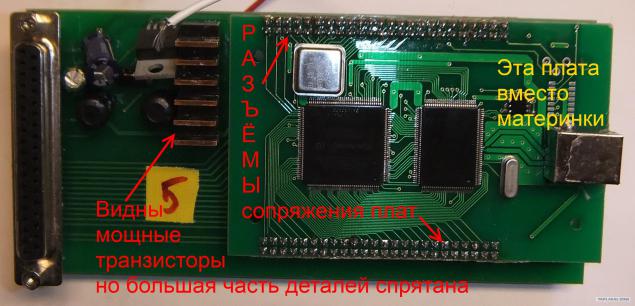
The text will be simplified as much as possible, so that the experts - do not swear much.
In addition, I write it on the train, so the possibility to check the historical facts I have not. I will write from memory, if mistaken - correct, but do not swear much, and write a better . It will be 12 pictures, please do not break, the end will outline separately. So. Talk about computers and their destiny.
In the photo - the unnecessary parts of the computer are thrown to the dustbin of history ...

First there was ... No, about computer dinosaurs, we will not talk. Let's just talk about the computers that belong to a microcomputer. What they had (and have) the structure?

And indigenous producers tried to sculpt everything on one card. Is that for the concept of "other controller" made expansion slots. But if you bought a computer in such a configuration, hello, enjoy them. Overall, it gave benefits from the taiga to the British seas configuration was united, there was no compatibility issues. But on the other - for Awareness, we had to buy everything new. And it is here that some genius, probably in the company IBM (may not be there - in the DVK was also something like that, but someone who stole - I do not know) has decided that a good idea would be to make an open architecture. The vast majority of devices, it was decided not soldered to the board. Instead, they are produced in small shawls (subsidiaries), and inserted into the motherboard, which is performed for the most part, unifying function. Houses pick wallpaper Google that explains it.

This ideology, applied to the IBM PC, broke the existing world order. First, of course, it was a complete mess, and incompatibility. But then came the specification PnP, there are good bus and everything was just wonderful. If we need something to replace - we simply confiscate cheap relevant fee (although a processor, memory even though the controller) from the motherboard and change it to another, leaving the system in a safe and sound, so we can gradually expand the computer (especially - in those a time when there was a race of new sockets and tires).
Computers made on this architecture, entered our life and in the office. Accordingly, we see them more often, and there is a feeling that's different and can not be. However, and who said that he could not? In the late 70s, for spacecraft, the firm has created an amazing Intel chip. By that time the domestic terminology it was called, no less, a single crystal micro-computer. The fact that Intel engineers have all the parts of the computer, that I mentioned above, but a little bit. RAM they have taken a few hundred bytes of ROM - a few kilobytes, the processor - a simple, chetyrёhbitny, the display was not, but there were serial and parallel ports. Since it was plain - it is perfectly fit on a single chip. That is, put on a single chip. Now I'll put a picture on the wrong chip, but with a similar size to the one (40 foot). The photo controller newer, but the essence is not in letters and in size.

4 bit controller did not catch on. But it has come to replace the 8-bit MCS-51 caught on how! No, he had not an exact copy of release, but the software is fully compatible improved version (for example, 4 cycles per team instead of the 16 in the original) still do many of the firm (let alone more than thirty years have passed). Let's look at a block diagram of the controller in the implementation by Atmel. The truth seems to be that I showed you in the beginning? Once all of these elements are not placed on the board and on the chip, which lives inside the chip!

You say, "Why do I have on the table is the PC, and not the little one?". My answer is - they do not for that matter. Let's look around. Here is a traffic light. They can be controlled by a simple machine, but let's say, if we want to change the mode depending on the time of day (or better - from road conditions), is not easy to do it with a computer? But do not drag the sake of the PC! The program is simple, the output port must be in the number of light bulbs in all traffic lights, plus input from the sensors of the situation. It turns out that the device will come in handy here. Have you been on the old elevators? At that it was necessary to keep the finger until you're blue call button to be the first to grab it as soon as it becomes available. This is because they simply ran the logic. Modern computer controls. Again, why there is power PC? It's simple, suitable and microcontroller. In the car right now any of these controllers - like seeds in a sunflower. In general, there are many applications where you can put this little friend, instead of a huge fools, which is sensitive to climate (aka Pin oxides), gluttonous, huge, not like vibrations (hard drive osypletsya) and so on. Inserting photos of modern fine controller standing on our board. Scale determine the 10 pin connector. Or, say, between the cogs on the terminal board 5 millimeters. The board receives data from the bus digital scales (which are not intended for this purpose) and transmits them to the digital radio broadcasting.

Or here's another case. Automatic opening-closing lid tank helicopter (I had such a position, who wants to - find). Initially, there was not such a fool's and horse dorozhennymi relyushkami a child's fist size that periodically oxidized and change - terrible costs money. The logic has been implemented in the same relay. Currents there, of course - in the cast of 25 amperes. But still ...

We have proposed to replace the transistors. The customer agreed. We quickly made the charge, which implemented the logic in the relay. Tested - it works. We put on a week-long test - worked. Hooking up to the helicopter - burns within 3 seconds. What? A long cable rattles, and even source - the relay, it also gives bounce. And during the bounce triggered the shoulder "Open", then "Close". Relays - the brakes, they do not care, transistors - more bright, that a short circuit arises. Tried to add filters, tried - the delay line on the capacitors - were something horrible: buggy and complicated in its structure goes. Then we take and replace the controller logic block. Along the way, add logic to soft start the motor by reducing the starting current roll, so - reducing the interference bortseti. And yet it turned out, the relay will start the engine, standing on the brake, because they often burn? We did delay from brake release before starting. In many utilities controller gave. And, as we see, motherboard here nafig not surrendered. Controller - in the thick of things, between inputs and outputs. And he sets the logic.

So, we found out that there are such beasts as microcontrollers, that they - themselves motherboard, because they contain a little of everything, so they were called in the USSR a single crystal microcomputer. We found out that they are designed for the needs of management of any equipment from the spacecraft to the intercoms (including recognition of "tablets"), so they were called overseas microcontrollers. And we have already seen the first generation - 8 bit MCS-51, which does not need a motherboard, as all units he etched on the main chip (about the possible external RAM and ROM I keep silence, to no one confuse). Almost immediately after that, Intel has released a 16-bit controllers tents MCS-96 (development - MCS-196). They had a much more successful architecture, do not speak out of nowhere, I was fortunate to work with them, but to the masses, they somehow did not.
Oh, and then began a controller boom. All companies considered it their duty to release any of the controllers with its unique architecture. Every company these architectures were several pieces. There were experiments with the bit processor core, because technology does not stand still, and in a crystal could put the core of powerful. There were 8, 16, 32 bit kernel. Oh, if I had poizuchat different assemblers! In different controllers shoved different peripherals someone in that much.
Needless to say, come and exclusion ideology. 32 bit kernel - this is clearly a great memory, so controllers steel output line for connection of RAM, which again began to solder the outside. Also steel output system bus as expansion slot. So basically, the motherboard has already become possible to connect, if not for one thing. Still, they are designed for the needs of management. Let me diluted Image text where our board controller is connected via a bus to the FPGA, in which we bundled software blocks that is not in the controller.

And suddenly the whole orgy of architecture has gone on there. And to blame the firm ARM, who came up tents RISC architecture (added - they do not come up very RISC, they came up with their architecture-based RISC) and now it is gradually developing. Architecture - floating. You can turn on the weaker, but poekonomichnee (coded command 16 bit words), but you can - porastochitelnee but poproizvoditelnee (encoded 32 bit words). Obrayuatyvaemye data - 32 bit (and new versions are already 64 bit rudiments appeared).
His processors they do not produce, they only make architecture and sell them. Already manufacturers - buy and sell ideas in crystals. Anyone who previously rivet their decisions, or fold them away from sin and switching to ARM, or continue to make their own, and ARM - also released. Let's open up my home computer and see it (the house open and sfotkayu). That's hard drive. In it manages all the affairs of ARM. ARM is engaged in translation logic in physics, the speed of rotation of the support, holds the head on the track ... No, I do do special terminal chips, but if you look at the "firmware", you will see that all the logic is still on the controller.

Here the optical drive. They ARM is not domination, but still gradually displaces all other architectures. In my it's worth. Of course, the manufacturer has placed on the periphery of the bunch this crystal-specific optical drives. It - special version of the controller, for other tasks, it is not suitable. And that's the beauty of their production - you can order something special, and we will not give up. But in simple shops selling peripheral controllers with the average on board. Che's something I'm too lazy to open again, and the old photo is not very photogenic. Naidu-ka I charge the same for Google.

In short, we found that the microcontroller - is a computer that has the vast majority of devices are etched on the main chip. His task - intelligent control different devices. Therefore, his legs already connected terminals (possibly - through Conditioners interfaces). Therefore, not the fact that he needed a graphics card that is - not the computer as we know it. And he did not need a motherboard. He is soldered directly to the board, where the controlled product (well, or pay him to the board is connected as shown in the figure below - on top of the controller board, and the bottom - an optoisolator, which is not visible, it came under the processor card and adapter in the brutal 24-volt level). And if the processor architecture Baykal declared ARM, then it must be something like that.
Oh, the train is coming! I swing, I have everything.
P.S. Added to the publication: Everything about repression - it is about navёrnutye architecture. "Big Three" eight-bit world - MCS-51, PIC and AVR. I like the last. They have been and are not planning to disappear for are cheap to madness. ARMy at the current stage of technology may not be so are cheap.



